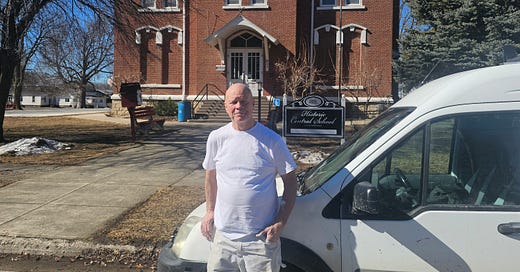Celebrating Life and Hope
Sure, you know organ donors save lives, but it gets real when it saves the life of someone you know.
Think back to when you were in high school. If you’re like me, you rarely considered that your teachers had a life outside of the classroom.
As an adult, however, you see these influential people in a new light. I was thinking about this when I watched a social-media video about “Why I’m an Organ Donor” from Stewart Memorial Community Hospital (SMCH) in my hometown of Lake City.
As someone who has checked “yes” to being an organ donor when I’ve renewed my driver’s license, that video made me think of Scott Nesbitt (“Nez”), my high school speech teacher. I knew he’d received a liver transplant, and I was grateful he was willing to share his incredible story.

It started on May 12, 2009, when Nez was 47. The Pocahontas native was in great health and had been teaching high school English and speech classes for 25 years, mainly in Lake City. He and his wife, Janelle, were raising their three school-aged children: MaeLaan (10th grade), Brock (7th grade) and Jaden (4th grade).
That Saturday before Mother’s Day, Nez suddenly felt nauseous. When a high fever kicked in, he and his family chalked it up to influenza, which was going around the local school. Nez took acetaminophen (a pain reliever/fever reducer sold under trade names like Tylenol®), but nothing helped. Within a few days, he made an appointment at SMCH to see his family doctor, who suspected Nez had contracted a virus.
Things only got worse. Nez was admitted to the hospital on day four after his symptoms appeared. Tests revealed alarming liver counts, which measure the proteins, enzymes and other substances that indicate how well the liver is functioning. “While counts of 0 to 40 are normal, mine were 8,000 to 10,000,” Nez said. “My first question was, ‘Am I dying?’”
Nez’s doctor immediately consulted with an organ-transplant team at the University of Nebraska Medical Center (UNMC) in Omaha, where Nez was transported by ambulance. “Had my doctor waited 12 more hours to make this decision, I would have died,” said Nez, who was immediately put on the national donor network system in search of a liver.
Nez had contracted hepatitis A, which inflames the liver. (The virus is transmitted when a person ingests contaminated food or water.) He had also taken too much acetaminophen, which stressed his infected liver. “I was poisoning myself and didn’t realize it,” he said.
While UNMC’s skilled doctors perform about 350 liver transplants a year, Nez had nearly everything working against him. His body was shutting down, plus he had a rare blood type requiring an exact match. As the hours passed, things looked hopeless.
Then a miracle happened! Nez would receive a liver from a 33-year-old named Brian Gorman. The liver was flown from Cheyenne, Wyoming, to Omaha. While Gorman had died by suicide, this tragedy offered new life for Nez, who had been perfectly healthy a mere eight days earlier.
While the transplant wasn’t without its complications, it was successful. Nez was able to return to his family (which now includes nine grandchildren). He returned to teaching in the fall of 2009. While Nez retired in 2022, he continues to work about 30 hours a week with his painting business. “I appreciate everything so much, including things I used to take for granted,” said Nez, 63, who serves with his church’s youth group and chairs the SMCH board of directors.
I first wrote about Nez’s story this past April, in time for National Donate Life Month. All this speaks to something bigger—a cherished time of renewal, new life and faith, where the greatest gift is hope.
Did you know every 8 minutes another person is added to the transplant waiting list? More than 103,000 men, women, and children are on the national transplant waiting list, according to organdonor.gov. Sadly, 17 people die each day waiting for an organ transplant. The good news is that every donor can save 8 lives and enhance more than 75 lives.
According to a sample of the U.S. population, 90% of adults support organ donation, but only 60% are actually signed up as donors, noted organdonor.gov. You can help! There is no age limit to be an organ donor. Shared ethnicity is not a requirement for matching organ donors and recipients. A larger donor registry gives everyone on the transplant waiting list a better chance to find a good donor match.
To become an organ donor, you can register with your state’s donor registry, or through your driver’s license when you renew your license. As Nez’s story shows, the gift of life makes a world of difference to so many people, including those right here in our community.
Have you explored the variety of writers in the Iowa Writers’ Collaborative? They are from around the state and offer an intriguing variety of perspectives, focused on Iowa and the Midwest. Please consider a paid subscription. It helps keep us going, and it keeps you in the know. Thank you!





